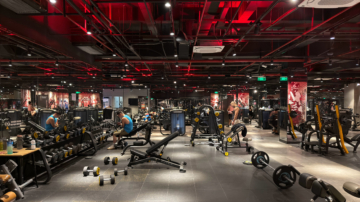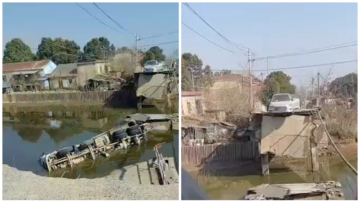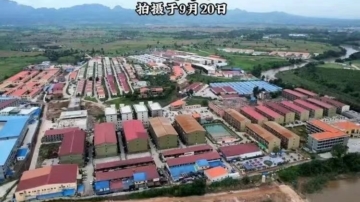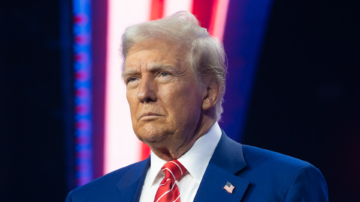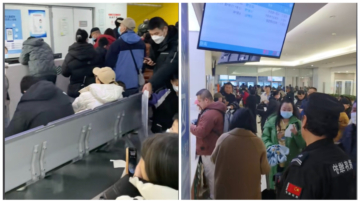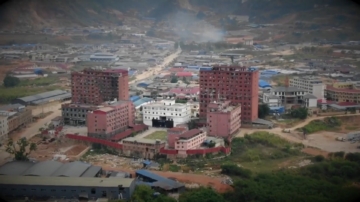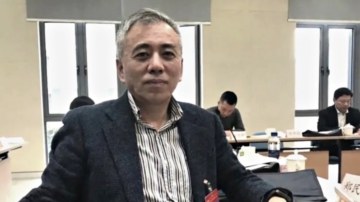【新唐人2011年2月16日讯】有人说,中国只有两种人----“体制内人”和“体制外人”。而眼下,争相回到体制内,成为中国最时髦的命运转机。那么,体制内外到底有甚么区别呢?让我们来看看。
在中国,体制内和体制外是个含糊的说法,似乎是只可意会不可言传。一般,体制内,就是当今的公务员和有行政职能的事业编制;体制外,就是前两者之外的,如依托市场经济体制的企业、纯市场化运作的事业单位、个体、自由职业、无业者等等,以及广大的农民,俗称P民。
而体制内到底有多诱人?英国《金融时报》陶笸箩的文章《到“体制内”去!》说了一个最简单的测试方法:就是去体制内的食堂大吃一顿。
去年12月12号深夜,南京市级机关事务管理局网站上的“每周菜谱”,被网友截图,发布在各大网站上后,引起数万名网友围观。这120道菜谱最低5角,最高才2元5角,这个体制内食堂让网友感叹:“太便宜了,太丰富了。”
而四川成都市锦江区机关事务管理局,从2010年1月4号起,早中晚饭实行的“一元就餐制”也被网友发帖曝光而引发热议。
陶笸箩还谈到,体制内的好处远远不止这点,GDP涨得越高,百姓税负越重,当全中国百姓都水深火热,被房价、物价抽筋扒皮的时候,只有体制内还可以安之若泰。
史学家苏明教授指出,中共想尽了办法从人民的口袋里搜刮钱财,是为了维持这个政权的继续存在,但是目地既不是为国,更不是为民,不过是为了“体制内”的一小撮既得利益的特权分子。
苏明:“一位金融经济学家,经过长时间的研究以后得出的一个数字,那就是共党的干部们每年桌子底下的黑色收入,竟然占到了当年GDP的30%。就说共党贪腐的钱占二十六万亿的GDP的30%,那就是说接近八万个亿是进了共党层层干部们的腰包里去了。”
例如,在中国,“经济适用房”普通老百姓多花钱也别想买到,能享受的却是“体制内”的人。
去年陕西山阳县,被爆光“经济适用房”申请者九成是公职人员后,今年1月13号,福建省上杭县的“经济适用房”申请名单引发网民强烈关注,因为其中申购者87%是来自政府部门、事业单位的公职人员。
2009年,福布斯杂志推出全球税负痛苦指数排行榜,中国排名全球第二,排名第一的则是法国。两者之间不同的是,法国民众享受着优越的社会福利。而中国人税收越来越重,却有数亿民众只交税,享受不到任何养老、医疗、失业保险、住房补贴、义务教育福利,因为,他们是“体制外”的人。
新唐人记者李静、薛莉综合报导。
Two Different Lives of Insiders and Outsiders of Chinese System
Some say that China only has two kinds of people,
“insiders of the system” and “outsiders of the system.”
Currently, rushing back into the system has become
the most fashionable turn for the better.
What’s the difference between insiders and outsiders?
Let's take a look.
In China, “the system” is a vague description.
It can be understood, but not describable in words.
Generally speaking, “within the system” refers to
people in civil service and administrative agencies.
“Outside the system” means in other institutions,
such as firms based on market operations,
professionals, unemployed, and peasants,
known as the P people (the unworthy).
How attractive is it to be within the system?
Tao Poluo published an article in UK’s Financial Times,
"Go into the system, " in which he mentioned
a simple way to taste the benefit:
dine in the “cafeteria within the system.”
In Dec. 2010, netizens published on line a
"Weekly Menu" of Nanjing municipal agencies.
It attracted the attention of tens of thousands.
Of the 120 dishes, the cheapest was 50 cents;
the most expensive was only 2 yuan and 50 cents.
Netizens lamented: "So cheap and so many varieties."
A government agency in Chengdu, Sichuan Province
started to offer “1 dollar lunch/dinner” in Jan. 2010.
Online posts about this sparked heated debates.
Tao said there are other benefits within the system.
The higher the GDP rises, the heavier the tax burden.
When all Chinese are tormented by high housing
and merchandize prices,
people within the system are imperturbable.
Historian Su Ming said, the CCP tried all means
to squeeze people's money from their pockets
for the survival of the regime.
It is not for the country or the people,
but for a small privileged group of vested interests.
Su: A financial economist got a number through
his calculation that the Party officials’ gray income
is equal to 30% of China’s annual GDP.
Out of the 26 trillion yuan of China’s annual GDP,
nearly 8,000 billion yuan is embezzled by the officials.
In China, "affordable housing" is out of the reach
of the ordinary people. It is enjoyed by “the insiders.”
In 2010, in Shanyang County in Shaanxi,
90% of applicants for affordable housing were found
to be civil servants. On Jan. 13, 2011,
the applicant list of "affordable housing"
in Shanghang County, Fujian, was posted online
and stirred up heated discussion,
as 87% were government employees.
In 2009, Forbes published Global Tax Misery Index.
China is ranked second, and the first was France.
However, the French enjoy a lot social benefits.
The Chinese only see increasingly heavy taxes.
Hundreds of millions of taxpayers are not entitled to
any welfare or social benefits,
because they are "outsiders of the system."
NTD reporters Li Jing and Xue Li
在中国,体制内和体制外是个含糊的说法,似乎是只可意会不可言传。一般,体制内,就是当今的公务员和有行政职能的事业编制;体制外,就是前两者之外的,如依托市场经济体制的企业、纯市场化运作的事业单位、个体、自由职业、无业者等等,以及广大的农民,俗称P民。
而体制内到底有多诱人?英国《金融时报》陶笸箩的文章《到“体制内”去!》说了一个最简单的测试方法:就是去体制内的食堂大吃一顿。
去年12月12号深夜,南京市级机关事务管理局网站上的“每周菜谱”,被网友截图,发布在各大网站上后,引起数万名网友围观。这120道菜谱最低5角,最高才2元5角,这个体制内食堂让网友感叹:“太便宜了,太丰富了。”
而四川成都市锦江区机关事务管理局,从2010年1月4号起,早中晚饭实行的“一元就餐制”也被网友发帖曝光而引发热议。
陶笸箩还谈到,体制内的好处远远不止这点,GDP涨得越高,百姓税负越重,当全中国百姓都水深火热,被房价、物价抽筋扒皮的时候,只有体制内还可以安之若泰。
史学家苏明教授指出,中共想尽了办法从人民的口袋里搜刮钱财,是为了维持这个政权的继续存在,但是目地既不是为国,更不是为民,不过是为了“体制内”的一小撮既得利益的特权分子。
苏明:“一位金融经济学家,经过长时间的研究以后得出的一个数字,那就是共党的干部们每年桌子底下的黑色收入,竟然占到了当年GDP的30%。就说共党贪腐的钱占二十六万亿的GDP的30%,那就是说接近八万个亿是进了共党层层干部们的腰包里去了。”
例如,在中国,“经济适用房”普通老百姓多花钱也别想买到,能享受的却是“体制内”的人。
去年陕西山阳县,被爆光“经济适用房”申请者九成是公职人员后,今年1月13号,福建省上杭县的“经济适用房”申请名单引发网民强烈关注,因为其中申购者87%是来自政府部门、事业单位的公职人员。
2009年,福布斯杂志推出全球税负痛苦指数排行榜,中国排名全球第二,排名第一的则是法国。两者之间不同的是,法国民众享受着优越的社会福利。而中国人税收越来越重,却有数亿民众只交税,享受不到任何养老、医疗、失业保险、住房补贴、义务教育福利,因为,他们是“体制外”的人。
新唐人记者李静、薛莉综合报导。
Two Different Lives of Insiders and Outsiders of Chinese System
Some say that China only has two kinds of people,
“insiders of the system” and “outsiders of the system.”
Currently, rushing back into the system has become
the most fashionable turn for the better.
What’s the difference between insiders and outsiders?
Let's take a look.
In China, “the system” is a vague description.
It can be understood, but not describable in words.
Generally speaking, “within the system” refers to
people in civil service and administrative agencies.
“Outside the system” means in other institutions,
such as firms based on market operations,
professionals, unemployed, and peasants,
known as the P people (the unworthy).
How attractive is it to be within the system?
Tao Poluo published an article in UK’s Financial Times,
"Go into the system, " in which he mentioned
a simple way to taste the benefit:
dine in the “cafeteria within the system.”
In Dec. 2010, netizens published on line a
"Weekly Menu" of Nanjing municipal agencies.
It attracted the attention of tens of thousands.
Of the 120 dishes, the cheapest was 50 cents;
the most expensive was only 2 yuan and 50 cents.
Netizens lamented: "So cheap and so many varieties."
A government agency in Chengdu, Sichuan Province
started to offer “1 dollar lunch/dinner” in Jan. 2010.
Online posts about this sparked heated debates.
Tao said there are other benefits within the system.
The higher the GDP rises, the heavier the tax burden.
When all Chinese are tormented by high housing
and merchandize prices,
people within the system are imperturbable.
Historian Su Ming said, the CCP tried all means
to squeeze people's money from their pockets
for the survival of the regime.
It is not for the country or the people,
but for a small privileged group of vested interests.
Su: A financial economist got a number through
his calculation that the Party officials’ gray income
is equal to 30% of China’s annual GDP.
Out of the 26 trillion yuan of China’s annual GDP,
nearly 8,000 billion yuan is embezzled by the officials.
In China, "affordable housing" is out of the reach
of the ordinary people. It is enjoyed by “the insiders.”
In 2010, in Shanyang County in Shaanxi,
90% of applicants for affordable housing were found
to be civil servants. On Jan. 13, 2011,
the applicant list of "affordable housing"
in Shanghang County, Fujian, was posted online
and stirred up heated discussion,
as 87% were government employees.
In 2009, Forbes published Global Tax Misery Index.
China is ranked second, and the first was France.
However, the French enjoy a lot social benefits.
The Chinese only see increasingly heavy taxes.
Hundreds of millions of taxpayers are not entitled to
any welfare or social benefits,
because they are "outsiders of the system."
NTD reporters Li Jing and Xue Li

